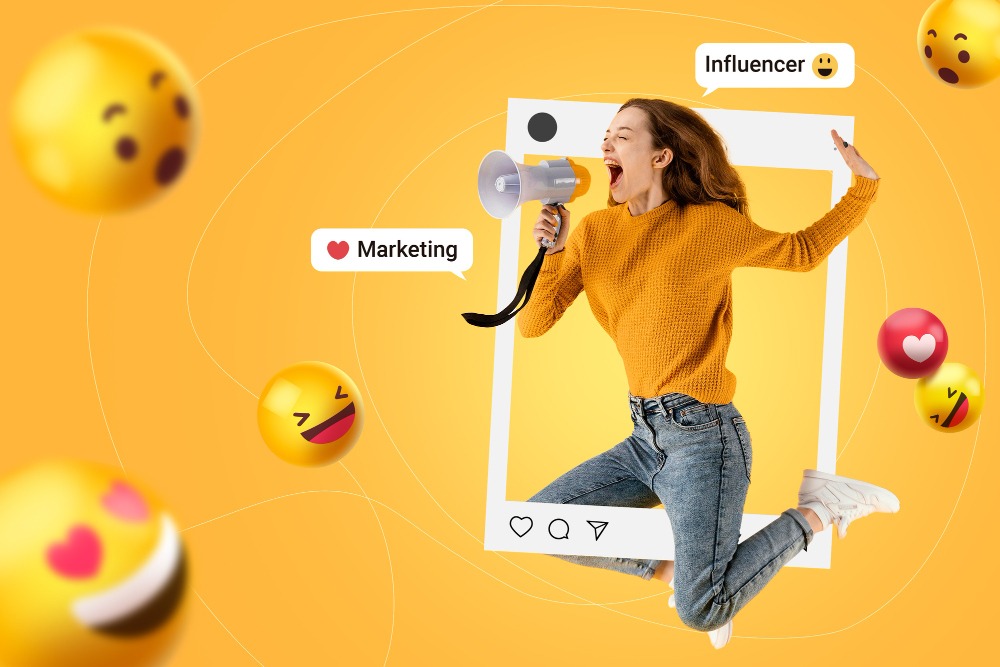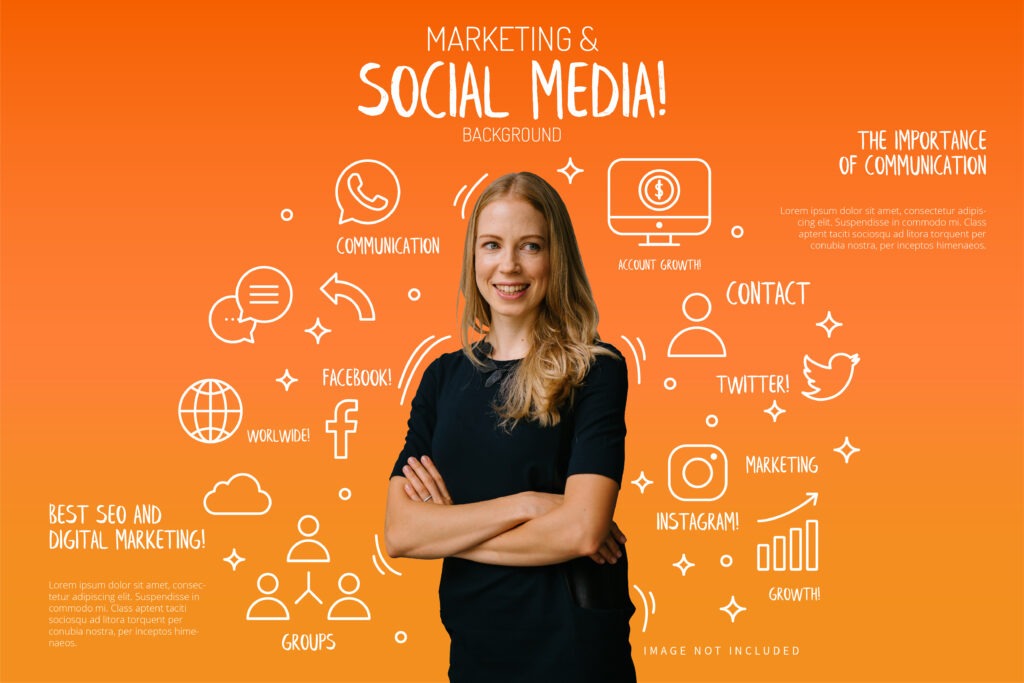What is social media marketing?
Your Social Media Marketing Guide:
Definition of social media marketing:
First of social media marketing (SMM), which is also called digital marketing or e-marketing, as specifically using social media websites. These websites are platforms on which users build social networks and share information. The sense of marketing, is by using social media to boost a company’s brand, increase sales, and drive website traffic.
Social media marketing is the process of promoting a product, service, or brand through various social media platforms, such as Facebook, Instagram, Pinterest, Twitter, TikTok, GoReal, Snapchat, Xing and LinkedIn. The goal of social media marketing is typically to increase brand awareness, engage with customers, and drive website traffic and sales. Businesses use a variety of tactics to achieve these goals, such as creating and sharing content, running paid advertising campaigns, hosting events and webinars, and analyzing metrics to measure success.
In short, social media marketing enables brands to more easily connect with their audience through social media networks.

Table of Contents
How to get started with social media
If you have no idea and are just starting out, here is a small social media guide, something you will need to create in more detail to be effective. A guide is a document or resource that provides information and instructions on how to effectively use social media for a specific purpose or goal. It can be a general guide for social media best practices or a specific guide for using a particular platform.
A guide may cover topics like:
- Setting up and optimizing your social media profile
- Creating and sharing engaging content
- Building a following and community
- Measuring and analyzing your performance
- Best practices for paid social media advertising
- Safety and security tips for using social media
Having a guide can be helpful for businesses, organizations, or individuals who are new to social media or looking to improve their social media presence. They can help to plan and execute a successful social media strategy, following the industry standards and guidelines.
It is important to keep in mind that Social media channels change frequently, and best practices also change, so it’s important to have an updated guide.
Social media strategy
A social media strategy guide is a document that outlines a plan for using social media to achieve specific business goals. It generally includes information on the target audience, the social media platforms to be used, and the tactics and content that will be employed to engage with that audience and achieve the desired outcomes.
A social media strategy guide can include the following elements:
- Goals and objectives:
- What the business hopes to achieve through its social media efforts.
- Target audience:
- The specific group of people the business wants to reach through social media.
- Platforms:
- The social media platforms that the business will use to reach its target audience.
- Content:
- The type of content that will be created and shared on social media, such as blog posts, videos, infographics, etc.
- Tone and voice:
- The style and personality that will be used to engage with the target audience.
- Metrics:
- The ways in which the business will measure the success of its social media efforts, such as website traffic, engagement, and conversions.
- Budget and resources:
- The financial and human resources that will be dedicated to the social media efforts.
- Timeline:
- A plan for when and how often different types of content will be posted, and the frequency of monitoring and reporting.
It is important to note that a Social Media strategy is not a set it and forget it kind of deal, it needs to be a living document, regularly revisited and updated. A regular monitoring of the progress and adapting based on the insights is important. It is also important to test, learn and iterate along the way to improve the effectiveness of your strategy.
Advantages and disadvantages of social media marketing
Social media marketing has both advantages and disadvantages, depending on the specific circumstances and how it is used.
Advantages of social media marketing:
- Cost-effective:
- Social media marketing is often less expensive than traditional forms of marketing and advertising.
- Wide reach:
- Social media platforms have billions of users, which makes it easy to reach a large and diverse audience.
- Targeted advertising:
- Social media platforms allow businesses to target specific demographics, interests, and behaviors.
- Engages audience:
- Social media allows for two-way communication, which can help businesses engage with their audience and build relationships.
- Can increase website traffic:
- Social media can drive more traffic to a business’s website and improve search engine rankings.
- Can give customer insights:
- Social media can provide businesses with valuable insights into their customers’ likes, dislikes and their feedback.
Disadvantages of social media marketing:
- Time-consuming:
- Managing a social media presence can be time-consuming and requires consistent effort.
- Competition:
- The vast number of businesses on social media platforms can make it difficult to stand out.
- Difficult to measure ROI:
- It can be difficult to measure the return on investment (ROI) for social media marketing efforts.
- Can be negative:
- Social media can also have negative effects on a brand, such as spreading false information, negative feedback, and bad reviews.
- Can be addictive:
- Social media use can be addictive, and an excessive use can lead to an unhealthy obsession with the online world.
- Risk of spreading misinformation:
- Social media can be a breeding ground for misinformation and conspiracy theories, and can be hard to control or monitor.
Overall, social media marketing can be a powerful tool for businesses, but it’s important to approach it with a clear strategy and realistic expectations, and also to be aware of the potential downsides and take steps to mitigate them.
Social media marketing Guide
Here are a few additional pieces of information that may not be widely known about social media marketing strategy:
- Developing a content calendar:
- Having a content calendar in place can help ensure that your social media presence stays active and consistent. It can also help you plan out content themes, promotions and events in advance.
- Using social listening tools:
- Social listening tools can help you track and analyze mentions of your brand, competitors, and industry keywords across social media platforms. This can provide valuable insights into what people are saying about your brand and can help inform your content strategy.
- Running A/B tests:
- A/B testing is a process of comparing two versions of a campaign to see which one performs better. This can be useful to test different headlines, ad copy, images, and call-to-action buttons to see which ones drive the most engagement and conversions.
- Influencer marketing:
- Partnering with social media influencers can be an effective way to reach new audiences and increase brand awareness. When looking for influencers, focus on those who have a genuine connection with your brand, product or services and have a significant following in your target market.
- Creating video content:
- Video content is becoming increasingly important on social media, and can be a powerful way to connect with your audience. Consider incorporating videos into your content strategy, such as product demos, behind-the-scenes footage, and customer testimonials.
- Integrating with other platforms:
- Social media platforms can be integrated with other tools such as email marketing, website chat, and CRM software to offer a seamless and personalised customer experience, and to help you keep track of all customer interactions in one place.
- Regularly reviewing and refining your strategy:
- Social media platforms and audience behavior change over time. It is important to regularly review your social media strategy and to make adjustments as needed to ensure that your efforts are still aligned with your goals and your target audience.

Other options than social media marketing
There are many options available for businesses to promote their products or services beyond social media marketing. Some alternative options include:
- Search engine optimization (SEO):
- Optimizing your website and content to rank higher in search engine results pages (SERPs) can help increase visibility and attract more traffic to your website.
- Email marketing:
- Sending targeted and personalized emails to your subscribers can help keep them engaged and informed about your products or services.
- Content marketing:
- Creating and distributing valuable and informative content, such as blog posts, infographics, and videos, can help attract and engage with your target audience, and drive more traffic to your website.
- Influencer marketing:
- Partnering with influential people in your industry or niche can help you reach new audiences and increase brand awareness.
- Affiliate marketing:
- Affiliate marketing is a performance-based marketing strategy in which a business compensates affiliates for each visitor or customer brought about by the affiliate’s own marketing efforts.
- Referral marketing:
- Referral marketing is a strategy in which a business rewards customers for referring their friends and family to the business.
- Public relations:
- Public Relations (PR) is the practice of managing the spread of information between an individual or an organization and the public. It can help shape public perception of a business and increase visibility in the media.
- Trade shows and events:
- Participating in trade shows and events can help connect you with potential customers and partners, and increase brand awareness.
- Direct mail:
- Direct mail marketing is a direct marketing strategy that uses physical mail to communicate with customers.
- Outdoor advertising:
- Outdoor advertising, such as billboards, bus shelters, and street furniture, can reach a large and diverse audience, and can be a cost-effective way to raise brand awareness.
It is important to find the right mix of marketing channels that work best for your business and your target audience, considering your budget and resources and also keeping track of the results to evaluate the effectiveness of different channels.
Social media marketing examples
Here are a few examples of how businesses have used social media marketing to achieve their goals:
- Dove:
- Dove’s “Real Beauty” campaign encouraged women to embrace their natural beauty, and was a huge success on social media. The campaign included user-generated content, such as before-and-after photos, and a video series that featured real women talking about their insecurities. The campaign was widely shared on social media, and helped increase brand awareness and engagement.
- Starbucks:
- Starbucks has an active and engaged presence on social media, with accounts on several platforms. They use their social media presence to promote new products, share customer photos, and engage with their audience. They also run regular promotions and contests to encourage engagement and drive sales.
- Red Bull:
- Red Bull has a strong social media presence, with a focus on visually stunning content and experiential marketing. They use social media to showcase extreme sports and adventure, and also to promote their own events and sponsored athletes. They also use live streaming platforms like Instagram and YouTube to broadcast events and activities and giving a behind the scenes look to their audience.
- Nike:
- Nike uses social media to connect with its customers, athletes, and fans around the world. They use Instagram and Facebook to share product images and videos, engage with their customers by encouraging them to share their own experiences, and showcase their brand values by promoting social causes and campaigns.
- Coca-Cola:
- Coca-Cola runs a very successful social media campaign called “Share a Coke” which encourages customers to share a Coke with their friends and family, and then post a picture of the shared Coke on social media using a specific hashtag. The campaign has been widely successful and helps to create a sense of community and engagement around the brand.
These are just a few examples of how businesses have used social media to achieve their goals. The key takeaway is that social media can be a powerful tool for businesses when used as part of a comprehensive and well-planned marketing strategy.
Your Digital Project Manager Olivier Jacob from your MyQuests team would love to help you with your social media. Contact us now.






